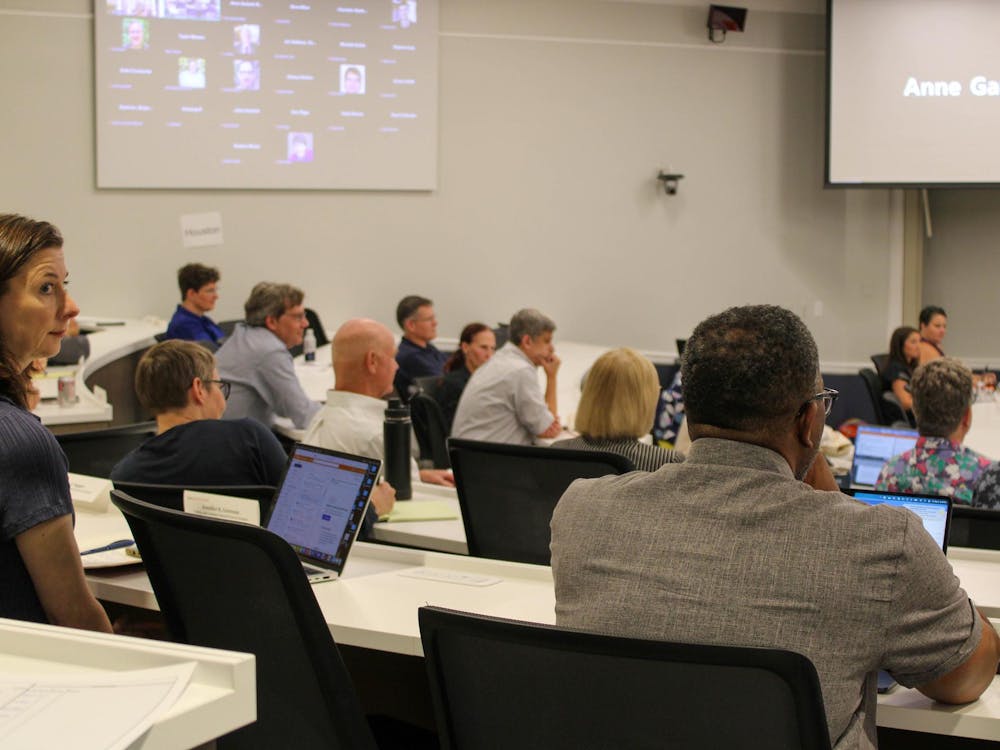After meeting with University administrators and public health experts Tuesday afternoon, Inter-Fraternity and Inter-Sorority Council leadership decided to transition recruitment mostly online. IFC recruitment will take place completely virtually. As of Tuesday, ISC recruitment will hold house tours online and preferences and bid day in person.
Fraternity and sorority recruitment schedules have overlapped with an all-time seven-day average high of 21.57 COVID-19 hospitalizations at U.Va. Health recorded Jan. 24. This is the highest since the system began collecting data in August 2020, per the University’s COVID-19 tracker.
Along with representatives from the IFC and ISC, Tuesday’s meeting was attended by Provost Liz Magill, Robyn Hadley, vice president and chief student affairs officer, Interim Dean of Students Julie Caruccio, Chris Holstege, executive director of Student Health and emergency department physician, Abel Liu, fourth-year College student and president of Student Council.
“University leaders and public health experts appreciate that these two groups have modified their plans for recruitment to make them all, or almost entirely, virtual,” University spokesperson Brian Coy said in an email statement to The Cavalier Daily. “This was a difficult decision, but one that was obviously made with the welfare of the broader community in mind, and we admire the compassion and care that motivated that choice.”
In an email statement to The Cavalier Daily, Liu said he was “struck” during Tuesday’s meeting by just how severe the present surge of cases is, noting that while he has not seen the IFC or ISC’s written updated rush policies, he appreciates that both decisions were made in an effort to honor public health advice.
“Public health experts made it clear that everyone in the U.Va. community needs to play a role in stopping the spread of COVID-19 by transitioning non-essential activities, including rush, online,” Liu said. “IFC and ISC enforcement of their new policies will be at once essential and the bare minimum in our shared effort to protect the U.Va. and Charlottesville communities.”
The ISC still plans to hold two rounds of recruitment in person — preferences, when potential new members make their final decisions — and bid day, which historically includes new and current members of the chapter gathering to celebrate. Typically, about 50 new members join chapters of anywhere from 100 to 200 women.
Per an email sent to chapter recruitment chairs obtained by the Cavalier Daily, ISC recruitment executives had been “strongly advised against doing any in-person component to recruitment” and saw moving house tours online as the “best compromise” to ensure a meaningful rush experience for potential new members.
As of press time, ISC leadership has not responded to multiple requests for comment on the policy change.
While there is wariness among some potential new members at the prospect of a diminished recruitment experience, others, such as first-year College student Antoinette Stewart, find aspects of the online format beneficial.
“I think [rush] being online for the first weekend is super helpful in letting people feel more comfortable when they first meet new people, and then once [they’re] feeling more adjusted to how it works, it’s nice to have it in-person to get a feel of ‘normalcy,’” Stewart said.
The ISC’s enforcement of University-mandated guidelines, such as the ban on food and drink and universal masking, is the responsibility of each member chapter’s recruitment counselors.
Aubrey Hill, fourth-year College student and pi chi — a member of a sorority who disaffiliates from her chapter in order to guide potential new members through the recruitment process — said she believes the University’s public health guidelines left an undue burden on students in Greek life to make difficult decisions about public health. Hill also reflected on the strong desire of some members to have a “normal” recruitment experience.
“The ISC is trying not to force anyone into any uncomfortable situation for them personally, and I think that there are a lot of chapter women who are frustrated that we can't be in person when you could be sitting next to all of those people in any of your classes,” Hill said. “I don't think that's necessarily a sound argument, but I do think that for the process as a whole there are a lot of people that will really, really benefit from going through it in-person.”
In a statement issued on behalf of the entire IFC Executive Board, members of the governing body wrote that they had decided to move rush online due to the spike in COVID-19 cases and hospitalizations and advice from health officials. The group acknowledged the dissatisfaction some potential new and current members will feel with the decision.
“As leaders on Grounds, [the executive board] has chosen to set an example that goes above and beyond what is expected of the student body in the name of public safety,” the statement read.
These changes come amid a large influx of hospitalizations at U.Va. Health, which Wendy Horton, chief executive officer at U.Va. Health and epidemiologist Dr. Costi Sifri elaborated on during a media briefing Jan. 21. There were 114 in-patients receiving treatment for COVID-19 as of Jan. 21, according to Horton. Of those COVID patients, 36 were in intensive-care units and six were pediatric patients.
“We are at our highest point of surge throughout the pandemic,” Horton said. “This is the most COVID patients we’ve had in house.”
Sifri emphasized that while Omicron is less virulent than previous variants of COVID-19 like the Delta variant, the hospital is still treating serious cases of infection from omicron.
“Omicron pretty convincingly doesn’t cause more deaths per infection than previous versions of COVID,” Sifri said. “However, omicron can cause very, very serious illness. We’re still seeing patient death, and we’re seeing them almost on a daily basis.”
The IFC had previously outlined a number of rules, including a complete ban on eating and drinking indoors and an attendance tracking system using QR provider Flowcode, in order to keep the rush process from contributing to a large number of cases.
CORRECTION: A previous version of this article incorrectly listed the participants who attended the meeting with IFC and ISC leadership. The article has been updated to resolve this error.







